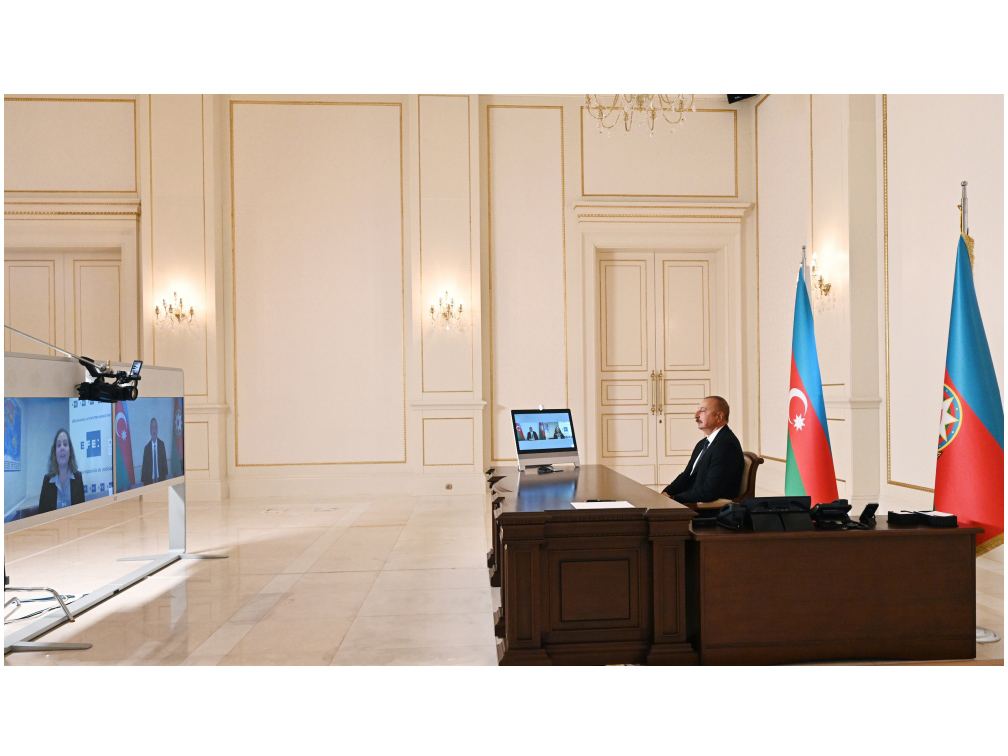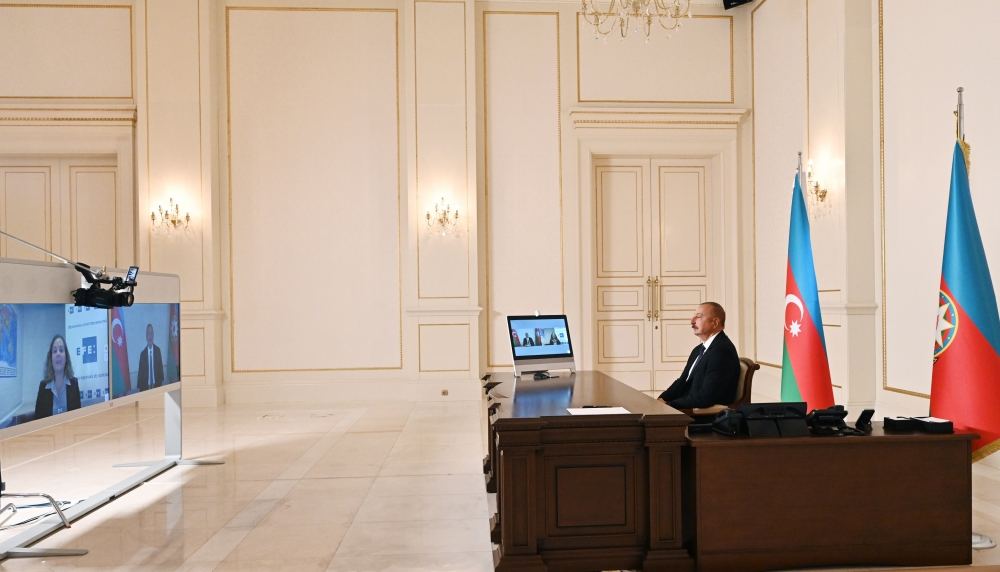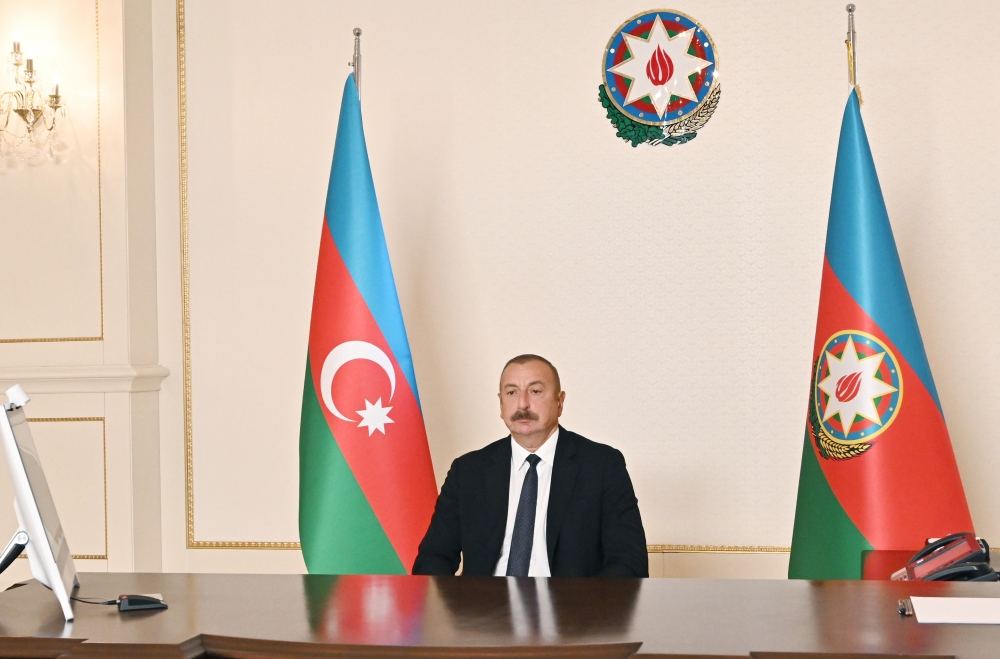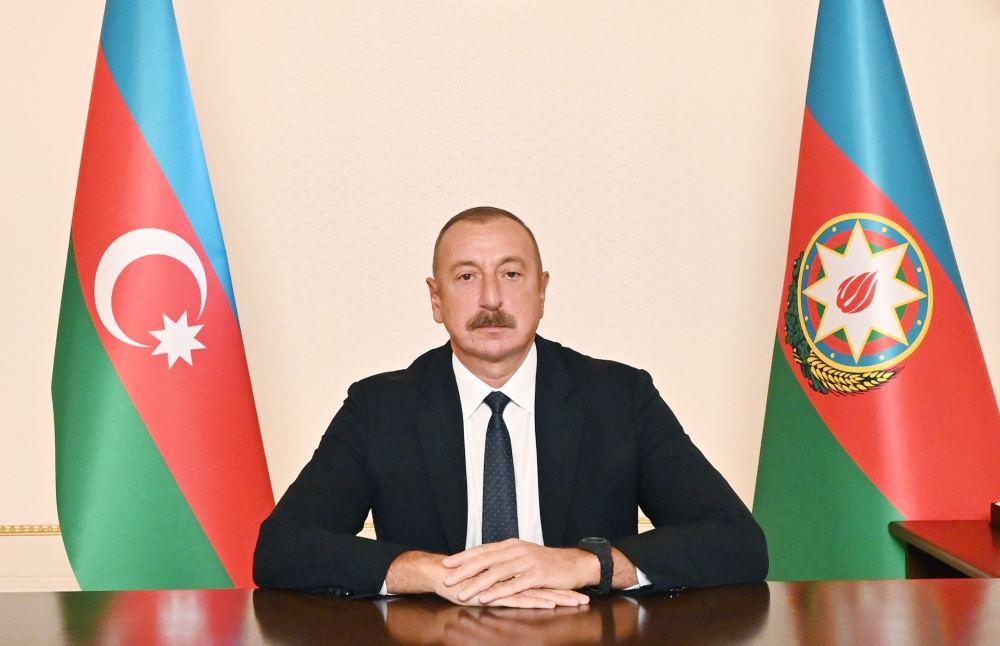BAKU, Azerbaijan, October 2
Trend:
President of the Republic of Azerbaijan Ilham Aliyev has been interviewed by Spanish EFE news agency.
Trend presents the interview.
-Good morning Mr. President.
-Good morning.
- Thank you very much for an interview.
-Thank you, very glad to see you.
-I really appreciate it.
-Thank you, thank you for this opportunity to address your audience.
-So, we will straight go to the questions.
-Yes, as you wish.
-Mr. President, a year ago the war in Nagorno-Karabakh started and you regained control over most of the territory. In November you told me that after the war you will be willing to sit down or return to the negotiation table. Are you now ready to sit down with Prime Minister Mr. Pashinyan and if yes, when you want to hold that.
-Yes, as I said you last time we are ready and actually the talks and the contacts have started. There is a format of cooperation on the level of deputy prime ministers of Azerbaijan, Armenia and Russia. This format is dedicated to the issues related to the opening of communications. Also, recently on the sidelines of the UN General Assembly session foreign ministers of Armenia and Azerbaijan met. That was for the first time since the war ended. I think that the meeting as far as I was informed by our minister was very constructive and promising. Our position remains unchanged, since the war ended, we want to establish normal relations with Armenia based on a mutual recognition of territorial integrity of both countries. We are ready to start immediately the process of delimitation of our borders. And, of course, after that process is ended-demarcation. We also express willingness to start to work together with Armenia on the future peace agreement. All these initiatives have been articulated on many times by me and by other Azerbaijani officials, but unfortunately, have not been yet positively responded by Armenian side. So our position is unchanged and there are certain steps, but I think during this year we could have made much bigger progress.
-But you don’t have any intention to sit down today with Prime Minister Pashinyan.
-I am ready, and I already expressed this position if Armenian side is ready, I am also ready. We had one meeting that was in trilateral format at the invitation of the President of Russia Vladimir Putin, in the beginning of this year. I am ready to talk to Mr. Pashinyan any time when he is ready. So, I am open for these discussions and I think that could be also a good indicator that the war is over and that page has been turned down. This is very important. Because still we see and we hear in Armenia, in political establishment, the statements which demonstrate the attempts of revanchism, the attempts of future plans to regain back territory which belongs to us by history and by international law. Therefore, the willingness of Armenian government, the serious willingness, not only words but statements and actions will demonstrate that the war is over, and we are moving towards the period of peace.
-But for Armenia there is still the question of the status of Nagorno-Karabakh and in the past you offered possibilities like cultural autonomy. Is that still an option or is it off the table?
-Frankly speaking, during the last period we do not hear from Armenia any statements referring to the status of that territory. Unfortunately, these ideas are articulated by some other countries, their higher representatives. As far as our position is concerned, I expressed it on many occasions during the almost 30 years of negotiations. Azerbaijan’s position was very constructive and we were saying and the Minsk Group co-chairs know it very well that we were ready to grant Armenians living in Azerbaijan a certain level of self-governance. But this position was always rejected by Armenia and they were always demanding independence for what they called Nagorno-Karabakh. But today after the war ended, and the conflict has been resolved, and this is not only my position, this is the position of the majority of the world international community, there is no room to talk about any status for the so-called entity which does not exist. Because Nagorno-Karabakh does not exist. We do not have this administrative unit on our territory. On 7 July this year I issued a decree about the new configuration of economic zones of Azerbaijan and we have created two economic zones: Karabakh and Eastern Zangazur economic zones which cover all the area. About 25 thousand ethnic Armenians who live today in Karabakh area, in the area which is now in the responsibility of Russian peacekeepers, are our citizens. They will enjoy the same rights and privileges and responsibility as any other citizen of Azerbaijan of different religious and ethnic origin. So, to put it shortly, no way to go back to the status, no status and everybody should forget this issue.
-Ok. There is a lot of other issues to discuss like you said the delimitation of borders, prisoners, demining. How is this going? Is it going forward or is it stopped?
-With respect to the so-called prisoners of war, I want to clarify this issue for your audience. I have on many occasions referred to international law norms, international conventions, about who can be considered prisoners of war? And according to international conventions those persons who have been detained or captured during the phase of war and those persons whom we detained during the war all of them have been returned immediately after the war ended. We actually returned them earlier than Armenians returned our prisoners. Those people who are now in detention and already sentenced whom Armenia and some others claim as prisoners of war do not belong to this category because these people have been sent to liberated territories in the end of November. More than two weeks after the war ended, more than two weeks after Armenia signed a capitulation act and they have been detained on the territory which we liberated in the beginning of December. 62 persons and some of them committed crimes, they attacked our military servicemen and killed four of them. So, they are not prisoners of war. They are terrorists, they are members of a sabotage group who’ve been sent in order to attack Azerbaijani civilians and military servicemen. Despite of that, we have returned some of them during this period, and that was a sign of good will. But with respect to the maps of mines which have been planted by Armenia in the territories, which were under occupation, and the 100 thousands of mines, in the beginning, when we were demanding to give us these maps Armenian government on the very high-level were saying that they do not have it. And during the time since war ended, during this almost one year, we had close to 150 casualties of civilians and military servicemen who either were killed or seriously injured due to the fact that Armenians do not give us the maps. Some maps have been given relatively recently but the accuracy of those maps is only 25 percent. So what we are demanding is that Armenia gives us the accurate maps, the map which can be easily identified not the area where they are planted, they are planted everywhere, but a particular place. They have this particular information which they refuse to give us. If they do it, if they show the goodwill, of course, we will respond adequately.
-The Minsk Group of OSCE is mediating but others also offered their help, like the European Union, for example, in demining or delimitation of the border. Is it an option for you that the EU has a role in the post-war conflict?
-Yes, we support this initiative and actually, it has been discussed during the numerous contacts between our officials and EU officials, and also during the visit of President of the European Council Mr. Charles Michel to Azerbaijan this summer. We broadly discussed post-war situation and expressed our joint willingness to engage actively. EU has a very big experience in different areas, in the areas of the construction, in the areas of creation of the peaceful environment. Therefore, EU expressed its willingness to participate in the process of delimitation to help both sides to come to an agreement, and we support this initiative. But as far as I know, Armenia is hesitant. Armenia did not decide whether they will accept the EU’s proposal or not. But Azerbaijan’s position is very open. We are ready to work and actually different levels of our officials were in permanent contact with EU. EU can help us in delimitation, EU can help us in opening of communications, and also post-war development. We also have been discussing with EU the issue of economic assistance. We heard and we know that EU have prepared or is in the process of preparing the economic recovery package for Armenia worth 2.6 billion euros. And of course, we expect that the same amount of money will be offered to Azerbaijan on the same terms and conditions. Whether it’s grants, whether it’s loans, it should be equal, because we are the country which suffered. We have 10.000 sq kms of totally destroyed territory, all the cities, hundreds of cities and villages. Therefore, we, of course, expressed our concern that this economic recovery package can be unbalanced and we are now in the process of communications with EU and expecting from them the proposal for us for economic support. So, EU can do a lot, and we are ready to use this opportunity and we trust EU as an honest broker.
-When do you think that the civil population can go back to the liberated territories?
-First obstacle of course is mines. Because without demining we cannot return civilians, because we cannot put their life under threat. Therefore, as I said many times, our main rival, if I may say so, is time. So, we are doing demining ourselves. We’ve increased the number of deminers in our national demining agency. Also, we increased the number of military servicemen who are also involved in this process. But it takes time. But despite in those areas where we have already had demining we already started to build settlements, cities and villages for civilians. First what we’ve done, we’ve done full survey of the infrastructure demands and the electric power infrastructure will be fully ready by the end of this year, in a couple of months. Also, issues related to roads and water supply are important. And we already started a couple of several months ago investments in one pilot village which will be ready to receive first settlers maybe by the end of this year, beginning of the next year. So this is the process already in the pipeline. We are preparing the master plans for all the cities, and later for the villages and we have allocated for this year only 1.3 billion US dollars for reconstruction of the liberated areas. So, it’s difficult to say exact time when it will start but it will start in stages. And the first stage, as I said will take place in several months.
-During the war you had the support of Turkey, and Russia acted as the facilitator for the ceasefire . Do you think the war has changed the balance of power in the region?
-Yes, Turkey supported us from the very beginning. We are very grateful to Turkish government for political and moral support they expressed from the first days of war and now after the war is over. Turkey is playing very important role in future regional development and regional stability in the region, as well as Russia. As you probably know, Russia and Turkey have joint monitoring center in the district of Aghdam in Karabakh region. At the same time, Russian peacekeepers are providing peacekeeping operations in the area which is inhabited by Armenian population. So, new realities already are in place, every country has to take into account these realities. The balance of powers between Azerbaijan and Armenia have been changed many years ago. We knew our potential, we knew Armenian potential. Probably, the Armenian government could not realistically evaluate that they have no chances in front of Azerbaijan, and if they do not liberate the territories peacefully they will have serious complications. Today I think about Turkey and Russia as two neighbors of Azerbaijan, and one of them is a neighbor of Armenia, plays very important role in the stability, security and future development. As you probably know, there was recently a meeting between presidents of two countries. Among other issues they discussed the situation between Armenia and Azerbaijan. We consider the role of both countries as a very positive stabilizing role and I think this is the bulk of the new regional cooperation configuration.
-That’s exactly what I wanted to ask, the possibility of active regional cooperation between the three South Caucasus states and 3 neighbor- Russia, Turkey and Iran.
-Yes we supported the proposal of Turkish president of this regional cooperation platform. 3+3. Armenia did not respond yet. You see, again unconstructive position of Armenia. But we fully support that and that will be very important for not only post-war settlement but in general for regional development in our area. Because if we are able to manage to create this format of cooperation between six countries of the region, that will be the main guarantee against any kind of new hostility, that will be an important factor for regional cooperation and it will generate a lot of benefits. Only due to opening of the communications which Azerbaijan strongly advocates for, we can immediately increase the trade turnover between the countries of the region, we can create maybe ten thousands of new jobs, only by the opening of communications. But if we enhance the mutual trade, if we concentrate on positive dynamics, our region will transform from the region of tensions to the region of stability and peace.
-My last question. Speaking of corporation, you started, Azerbaijan started at the end of the last year sending fine gas to the southern Europe. Currently European gas market, the storage levels are very low and the prices are rapidly rising. In this situation are you going to increase export and how much gas you have already sent to Europe?
-Well you are right. We have started our export of natural gas to Europe in the last day of the last year 31 December, and since that time the profile of our export is growing. We are a reliable supplier of oil to European market for many years, for 15 years without any disruption. And now as a reliable supplier of natural gas we play our role. Our gas is cheaper, than gas from different sources and it comes from a new source. The importance of the Southern Gas Corridor is not only because of its additional gas, but because of its alternative source. And this is an issue of energy security. Our gas which we are sending to European consumers have been contracted. We already sold it. Therefore, if there is additional demand from European consumers we need to start negotiations, because first you have to sell the gas and then you have to extract it. In the gas business it’s a common consequence of actions. And the deposits of the proven reserve of the natural gas in Azerbaijan are 2.6 trillion cubic meters. So, it will be enough for at least 100 years for our consumption and for exports. We are now in the phase of new discoveries. The interest of Azerbaijani oil and gas sector among the big energy companies is growing. So, we can increase the output and increase the production, but for that we need to start the negotiations now and sign new contracts and then we will invest to produce more.
-But that’s not possible for this winter I think, right?
-It is not possible technically and commercially, just one, two months left. But if we start now I think we will be ready for the next winter. There is a potential to increase, plus we are now actively investing in ourselves and foreign investors into renewable energy. Therefore, we will have more of natural gas which we consume ourselves for export. Because we will substitute it with the sun and wind energy. So, as I said, potential here is very big, pipeline is in operation. We in the future may expand our geography of supplies to Europe to Balkans to some other countries of Eastern Europe and that will be good for consumers, for us for companies, for everyone, for energy security.
-Thank you so much Mr. President I really appreciate it.
-Thank you very much. Wish you all the best goodbye.
-Goodbye.












